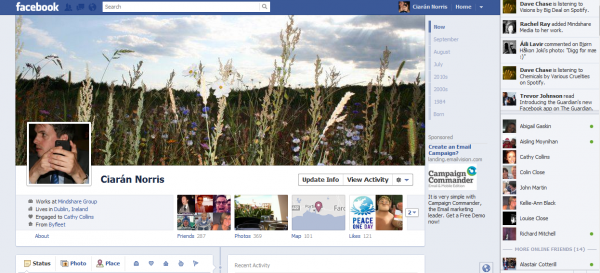Why Facebook’s Timeline Might Be Bad News For Brands
Last week’s F8 conference was full of news about where Facebook is heading, and how it intends to get there. It highlighted, for anyone who wasn’t already sure, that Mark Zuckerberg’s ambition for his company is huge: he want to be the glue that binds the Web together, in the same way that Google was […]
Last week’s F8 conference was full of news about where Facebook is heading, and how it intends to get there.
It highlighted, for anyone who wasn’t already sure, that Mark Zuckerberg’s ambition for his company is huge: he want to be the glue that binds the Web together, in the same way that Google was the index that made it usable.
I’m writing this the day after the anouncements, and have just turned on Timeline, but whilst it’s hard to make accurate predictions about what the end result of these changes will be, it does strike me that they may not be good news for brands trying to use the platform to connect with consumers.
The broad thrust of the F8 announcements can be summarised as putting Facebook squarely at the centre of your life, both online and off: watching Netflix, reading The Guardian, cooking a recipe or hiking up a hill.
This should be fantastic for users (so long as it doesn’t become overwhelming); as MG Siegler points out on Techcrunch, no longer will people have to stop, whilst listening to music/watching a film/etc., in order to like something and share it with their friend – it will now be shared automatically.
It also means that Facebook will become a true 21st media company; not a media owner, but a media platform.
For The Guardian, Netflix, Spotify and the like this could be a huge moment, opening them up to massive new audiences (in the case of companies like Spotify) and building the power of social context and peer recommendation into everything that they do.
But for brands who don’t make this type of content, these developments could make it much harder to use Facebook to engage with consumers.
Firstly, if Facebook becomes the place where people actually consume content, rather than acting as a gateway to that content, it’s simply going to be harder to stand out from the crowd.
If I’m on Facebook watching a movie, or reading an article, why would I want to engage with a branded app, unless it’s absolutely amazing, and really adds something to my digital life?
To a certain extent, this is already true: bad apps sink, good apps don’t. But when you add the new content structure into (Timeline & the ticker) the mix, this is only going to become even more true.
Because these sorts of interactions, which currently help brands cut through the noise on Facebook (likes, comments, etc…) will be sidelined, and placed in the ticker.
The Timeline, which will replace profiles, is, at first glance at least, so fascinatingly beautiful, it could become the focus of a lot of users’ attention: the way it sucked me in, they might as well have called it Timesink.
Of course they may make a jump, based on Facebook’s algorithms, into the main newsfeed, but it seems likely that it’s going to take a lot more for this to happen that it does at the moment.
If people start automatically sharing every song they listen to, movie they watch, or recipe they make, the ticker could become so noisy, that it’s almost impossible to make that leap; already people are feeling ‘stream fatigue’.
Of course, this could end up forcing brands to work even harder on creating truly engaging content and reasons for people to connect with them, which would be a good thing.
It’s also likely to drive the use of Facebook’s ad products, particularly Sponsored Stories, as brands try to cut through the noise and make the all important jump sideways, from the ticker to the ‘important news’.
For years, you’d hear people say that ‘content is king’; as the social Web started to develop, this turned into ‘conversation is king, content is just something to talk about’.
Now, we could say that Facebook is king, because it owns content and conversation, and brands will need to bow to the king if they wish to be heard.
Contributing authors are invited to create content for Search Engine Land and are chosen for their expertise and contribution to the search community. Our contributors work under the oversight of the editorial staff and contributions are checked for quality and relevance to our readers. The opinions they express are their own.
Related stories
New on Search Engine Land
